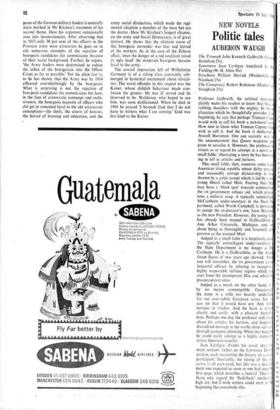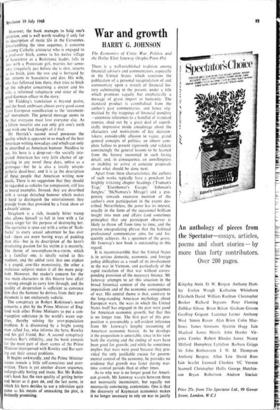NEW NOVELS
Politic tales
AUBERON WAUGH
Sauveterre Jean Larteguy translated to■ Fielding (W. H. Allen 30s) Strayhorn William ,Herrick (Weidenfeld ,- Nicolson 25s) The Conspiracy Robert Robinson (Hodder Stoughton 25s)
Professor Galbraith, the satirical econon plainly wants his readers to know that the\ rubbing shoulders with the mighty. In the planation which he thoughtfully provides a beginning, he says that perhaps Truman C. IN would wish to call his book a non-novel no, How nice to know what Truman Capote rn• wish to call it. And the book is dedicated Averell Harriman. One can scarcely wait the announcement that Queen magazine p poses to serialise it. However, the professor structs us to regard his attempt at a novel a,. small fable,' illustrating a story he has been ;- ing to tell in articles and lectures.
This small fable, then, concerns some Lan American island republic whose thirty year o and reasonably corrupt dictatorship is thrown by a golpe (coup) which is led by a r young liberal called Mira. Fearing that 1: may have a 'blind spot' towards communk the us government refuses aid, which prec.p tates a military coup. A typically unintel4t McCarthyite under-secretary in the State D partment, called Worth Campbell, is persuild to accept the ex-dictator's son, Juan Martine as the new President. However, the young la. has already been steeped in Galbraitliism Ann Arbor University, Michigan, and about being as thoroughly and fatuously p gressive as the usurped Mir6.
Judged as a small fable it is hopelessly d:,.: The typically unintelligent under-secretary the State Department is no longer a N1 Carthyi,te. He is a Galbraithite, as the Ar,:1: tinian fiasco of two years ago showed. 1her one will remember, the us government eau, immortal offence by refusing to recognise highly respectable military regime which :a over from the incompetent Illia and which F. prospered ever since.
Judged as a novel, on the other hand, it by no means contemptible. Occasional the irony is a trifle too heavily underlin for our over-subtle European tastes, but 0 can see that it would have any Ann Arb seminar in stitches. And the book is lw.ritt clearly and easily, with a pleasant bant..- tone. Perhaps one day the professor will fo-..; about his articles, his lectures, and hopeic-: discredited message to the world about sah through economic planning. When that happ-- he could easily emerge as a highly comp.', minor American novelist.
Jean Larteguy divides his novel into main sections. rather on the Lawrence Du' pattern, each recounting the history of a ni,:j participant. Inevitably, the timing of the n. rative is all cock-eyed, but this was a deveki ment one expected as soon as one had read t first page, which describes a funeral. There a those, who regard the 'flash-back' method high art, but I wish writers could start at t beginning like everybody else. However, the book manages to hold one's attention, and is well worth reading if only for its description of rustic life in the Cervennes. unscrambling the time sequence, it concerns a young Catholic aristocrat who is engaged to a pied-noir bitch, comes to his native village of Sauveterre as a Resistance leader, falls in love with a Protestant girl, marries her some- what irregularly just before she is shot, returns to his bitch, joins the OAS and is betrayed by her, returns to Sauveterre and dies. His wife, Who has followed him there, then tries to bitch up the sub-plot concerning a doctor and his Wife, a reformed voluptuary and sister of the Nod German officer in the story.
Mr Fielding's translation is beyond praise, and the book embraces almost every good cause from European reunification to the 'oecumeni- cal' movement. The general message seems to be that everyone must love everyone else. As a fellow novelist one can only grit one's teeth and wish one had thought of it first.
Mr Herrick's second novel possesses the quality which is apparent in so much of the best American writing nowadays and which can only be described as American humour. Needless to Nay, his hero is a drop-out—the socially inte- grated American has very little chance of ap- pearing in any novel these days, unless as a grotesque—but he is also a totally unsym- pathetic dead-beat, and it is in the description of these people that American writing now excels. There is no suggestion that they should be regarded as vehicles for compassion, still less as moral examples. Instead, they are described with a savage detached humour which makes it hard to distinguish the entertainment they provide from that provided by a freak show or a dwarfs' circus.
Stray'norn is a rich, insanely bitter tramp who allows himself to fall in love with a fat opera singer for the purpose of destroying her. The narrative is spun out with a series of 'flash- backs' to every sexual adventure he has ever had—there are more boring ways of padding than this—but in its description of the hero's .developing passion for his victim it is masterly. The theme of two-orphans-in-a-storm, which is a familiar one, is ideally suited to this medium, and the added twist that one orphan is a stupid, cow-like monstrosity, the other a malicious solipsist makes it all the more poig- nant. However, the reader's concern for the two main characters in this bizarre love affair is strong enough to carry him through, and the quality of desperation is sufficient to convince him that the humour he derives from their pre- dicament is not exclusively sadistic.
The conspiracy in Robert Robinson's novel concerns a plot by the Prime Minister of Eng- land with other Prime Ministers to put a con- traceptive substance in the world's water sup- plies, thereby solving the over-population problem. It is discovered by a bright young man called Jay, who informs the hero, Rowley and his girl friend, Bar. A second conspiracy involves Bar's infidelity, and the book consists for the most part of short scenes of the Prime Minister interspersed with Rowley and Bar sort- ing out their sexual problems.
It begins awkwardly, and the Prime Minister scenes remain a little self-conscious and over- written. There is yet another dream sequence, unforgivably boring and inane. But Mr Robin- son's book has the rare quality of getting better and better as it goes on, and the last scene, in which his hero decides to use a television quiz game as his means of unmasking the plot, is distinctly promising.







































 Previous page
Previous page